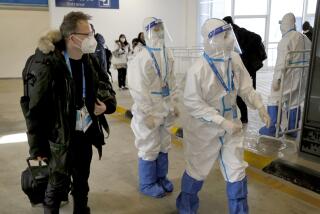Beijing Implores Residents to Go for Gold in Etiquette
- Share via
BEIJING — Barely a week after this city won the right to host the 2008 Olympics, the civic navel-gazing began--and officials weren’t too pleased with the lint they saw there.
In a candid assessment last month of his constituents’ faults, Beijing Mayor Liu Qi listed a dozen bad habits that would make New Yorkers seem the very paragons of couth and culture.
Beijingers, Liu griped, spit in public way too much (No. 1 nasty habit). They jostle (No. 2). Like defensive linemen, they block passengers desperate to get off the subway (No. 3). The cabbies are aggressively surly (No. 5), and people on the street can swear like sailors (No. 6). Nobody ever smiles or says “Excuse me” (Nos. 7 and 9). And can no one in this town shut up for even a New York minute (No. 11)?
Such a sloppy civic image doesn’t befit this ancient capital, Liu declared--and so began another in a string of government efforts to foster public virtue.
China is a country obsessed with how it looks in the eyes of the world, and the 2008 Summer Games, locals say, will give Beijing a chance to shine in the spotlight.
But along with new stadiums and new traffic patterns, city officials are stressing the need for a new sense of “spiritual civilization,” China’s lofty term for good manners. Don’t jostle. Just say no to jaywalking. Hold the spit--but keep the polish.
The effort targets everyone, young and old. From the 18 spiritual civilization training centers set up across Beijing to primary-school classes where kids memorize the rules of good conduct, the emphasis is on how to be gracious and considerate.
It might seem a strange campaign in a land where intricate codes of politeness governed behavior for thousands of years, the legacy of Confucian ideals and complex social hierarchies. In imperial days, there were rules and rituals for everything, from the proper way of addressing a superior to the appropriate hairdo for one’s social status.
But a population explosion and the rapid development of the last two decades, including the advent of cars and cabs and cell phones, have left etiquette struggling to catch up.
Your average Zhou, who may exhibit impeccable manners in private relationships, is unfamiliar with the rules for impersonal public situations.
“They’re just not used to it,” said Yue-Sai Kan, a cosmetics maven and the author of a best-selling manual on etiquette. “They never had to know how to behave in a supermarket, because it wasn’t until 10 years ago that they had supermarkets. What about cell phones? Ten years ago, they’d be surprised if you had a phone in your home.”
Innovations like these are forcing Chinese to interact in public with strangers, Kan said. But “they really don’t know [how]. Who would have told them?”
That’s where the Communist regime has kindly stepped into the gap, drilling the masses in the sort of orderliness expected of them as Beijing gears up for the Olympics.
The first activity up for behavioral modification: riding the bus.
Crowds of people throng Beijing’s bus stops, waiting to board vehicles already packed with passengers. Flying leaps onto the moving vehicles aren’t uncommon, and elbows and faces can come into unwelcome contact. Trying to get off at your stop can be like trying to part the Red Sea.
Unacceptable, officials say.
“Everyone wishes to have a civilized riding procedure and a friendly riding environment,” the municipal Spiritual Civilization Construction Committee says on its Web site. “But it is not enough to rely merely on the government’s effort to reach that goal.”
Residents are therefore invited to join the “Civilized Ridership Starts With Me” campaign. Its tenets: Line up patiently to board. Give up your seat--politely--to the elderly, the young, the disabled and the pregnant.
“These seem like small things, but they reflect our morality and the civility of the capital,” the Web site reminds its readers.
If voluntary compliance with common courtesy fails, then there are other ways of enforcing civic propriety.
Liu Guangfa, an attendant in one of the city’s most beautiful parks, is the man who puts the “fine” in “refinement.”
“I have the right to fine people 5 yuan [60 cents] if I catch them spitting or littering,” he said recently, looking ready to pounce on the unsuspecting boors.
Liu, however, doesn’t blame his fellow Beijingers for the rude behavior so often evident in public places. The culprits, he says, are usually out-of-towners or migrants from the provinces and the countryside.
“Most of the people I catch aren’t Beijing folks. And even if Beijingers do those things, they would say sorry and pay the fine because they know it’s not good conduct,” he said.
“But the yokels, they don’t even think they’ve done anything wrong,” Liu went on with a contemptuous snort, “and refuse to be punished.”
No. 10 on the mayor’s dirty dozen list of Beijing’s flaws: looking down on migrants.
300 Million Chinese Spit in Public, Survey Shows
Newcomers to the city are by no means alone in the phlegm habit. An independent survey on spitting this year showed that 300 million Chinese expectorate in public and that spitting “cannot be considered just a peasant habit.”
More than 70% of those polled thought that a little projectile clearing of the throat was no big deal. Nearly 20% felt it a natural, healthful activity that they would be uncomfortable giving up. A fastidious 3% said, “Don’t spit . . . swallow.”
The reasons given for public expectoration varied, from coping with air pollution (“It’s disgusting and makes me want to spit”) to striking a pose (“I am a hoodlum; I fear no one”) to outright fear (“If I appear too clean, others will spit on me”).
Changing such an ingrained habit will be tough. But the municipal government apparently feels equal to the task of getting the public to mind its manners in time for the Olympics, as long as residents keep some officially approved slogans in mind:
“Civility links you and me; create a beautiful new life together.”
“Traffic safety is in my heart.”
A Warm People Who Talk Too Much
Beware of wordiness, though, which qualifies as one of the 12 public sins. “Beijingers are very warm people, and they talk a lot, but sometimes it can get embarrassing,” the official New China News Agency noted.
“They do talk too much, and talk big,” agreed resident Liu Fang, 46, whose job is to patrol her neighborhood and educate her neighbors on, well, neighborliness. “This is characteristic of Beijingers . . . but it’s not such a bad thing, as long as you sometimes back up your words with actions.”
Nearly 300 Chinese student athletes and sporting officials did just that last week before the opening of the World University Games in Beijing, an international collegiate sporting event that has attracted 6,800 participants from around the world and that some see as a preview of 2008.
More people showed up--some who had not registered beforehand--than the planning committee had allowed for, causing a housing crunch before the games officially opened Wednesday. So 299 members of the Chinese delegation gave up their spots in the athletes village for accommodation in a nearby hotel.
It was a gracious gesture of a kind the Beijing government hopes to inspire in all its citizens, the same thoughtfulness and consideration that Kan, the cosmetics queen, aimed to promote through her bestseller on manners.
Her manual, “Etiquette for the Modern Chinese,” is in its seventh printing and has sold hundreds of thousands of copies. Of course, China has 1.3 billion people, but “you have to start somewhere,” she said.
Even if it is just a drop in the spittoon.
More to Read
Go beyond the scoreboard
Get the latest on L.A.'s teams in the daily Sports Report newsletter.
You may occasionally receive promotional content from the Los Angeles Times.







